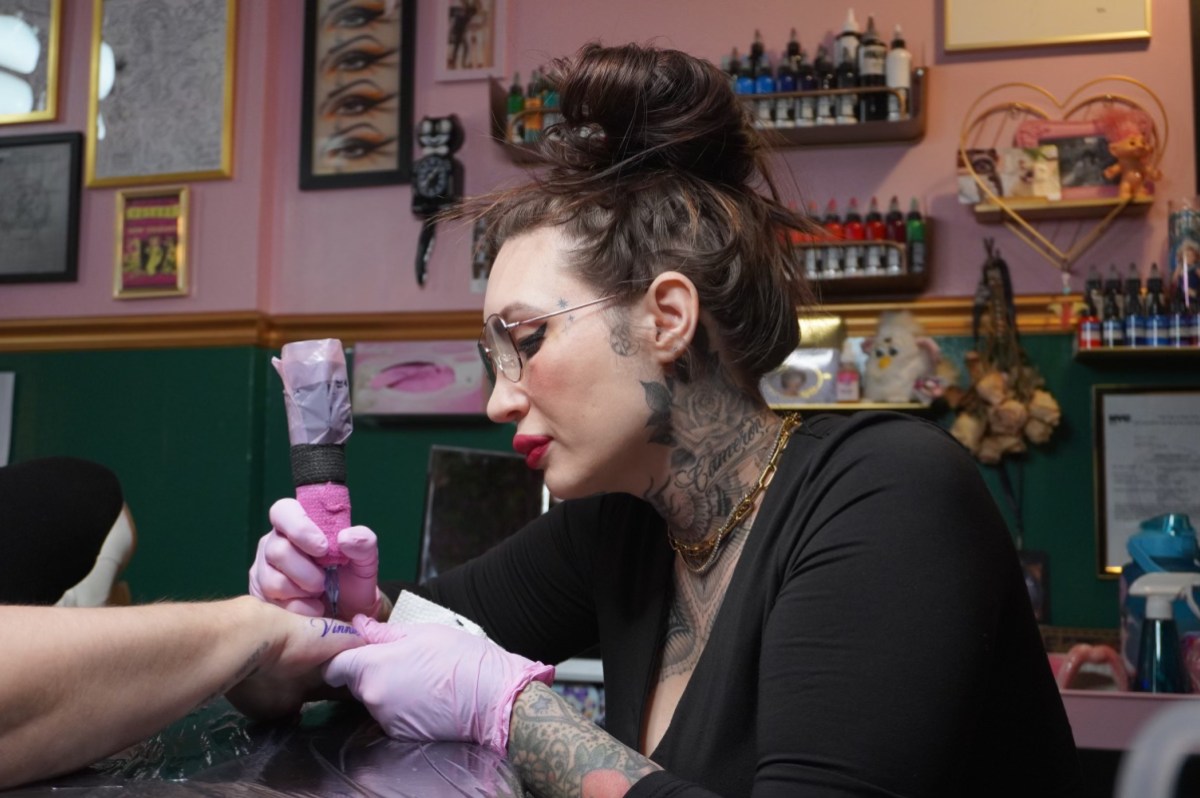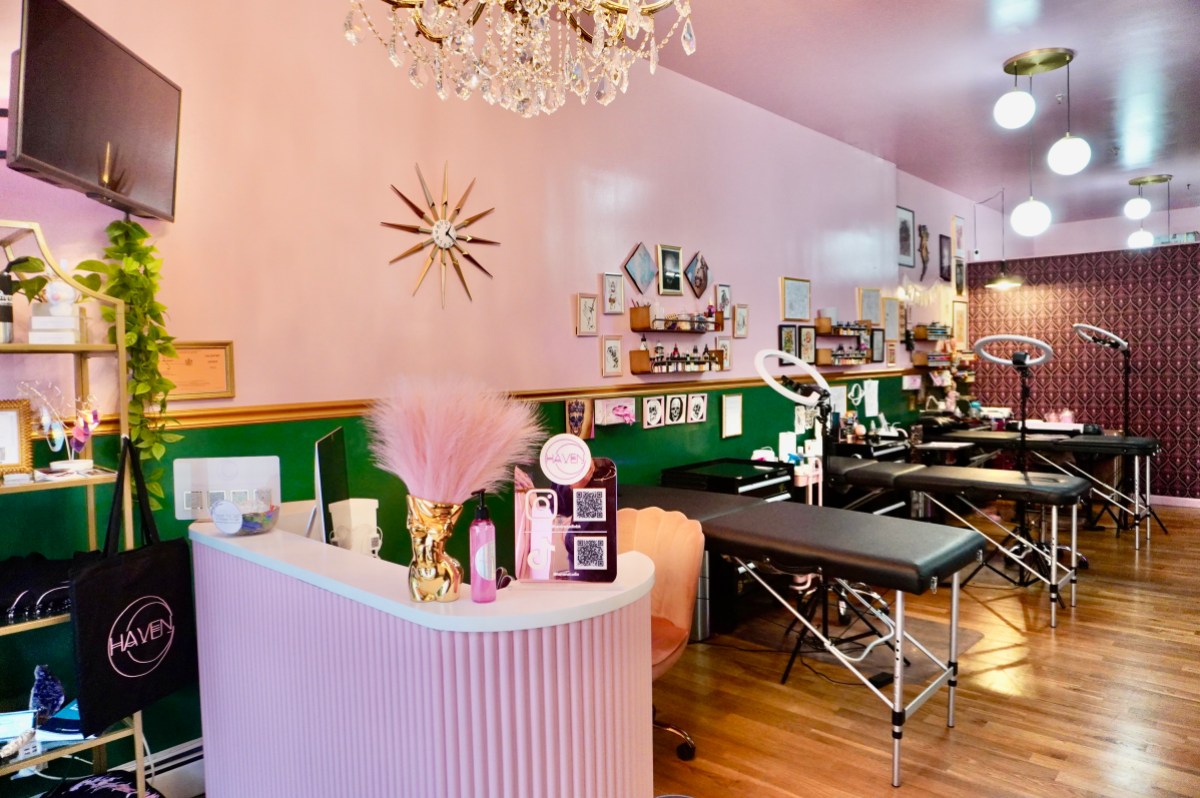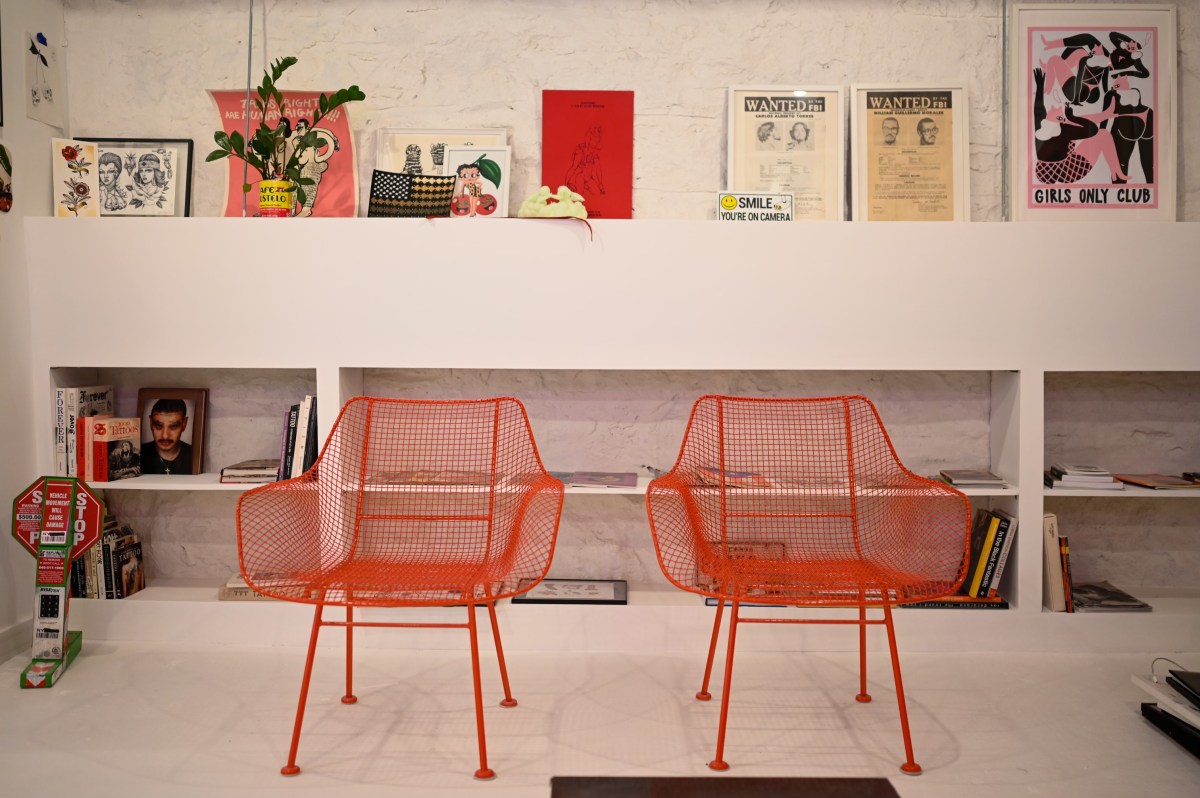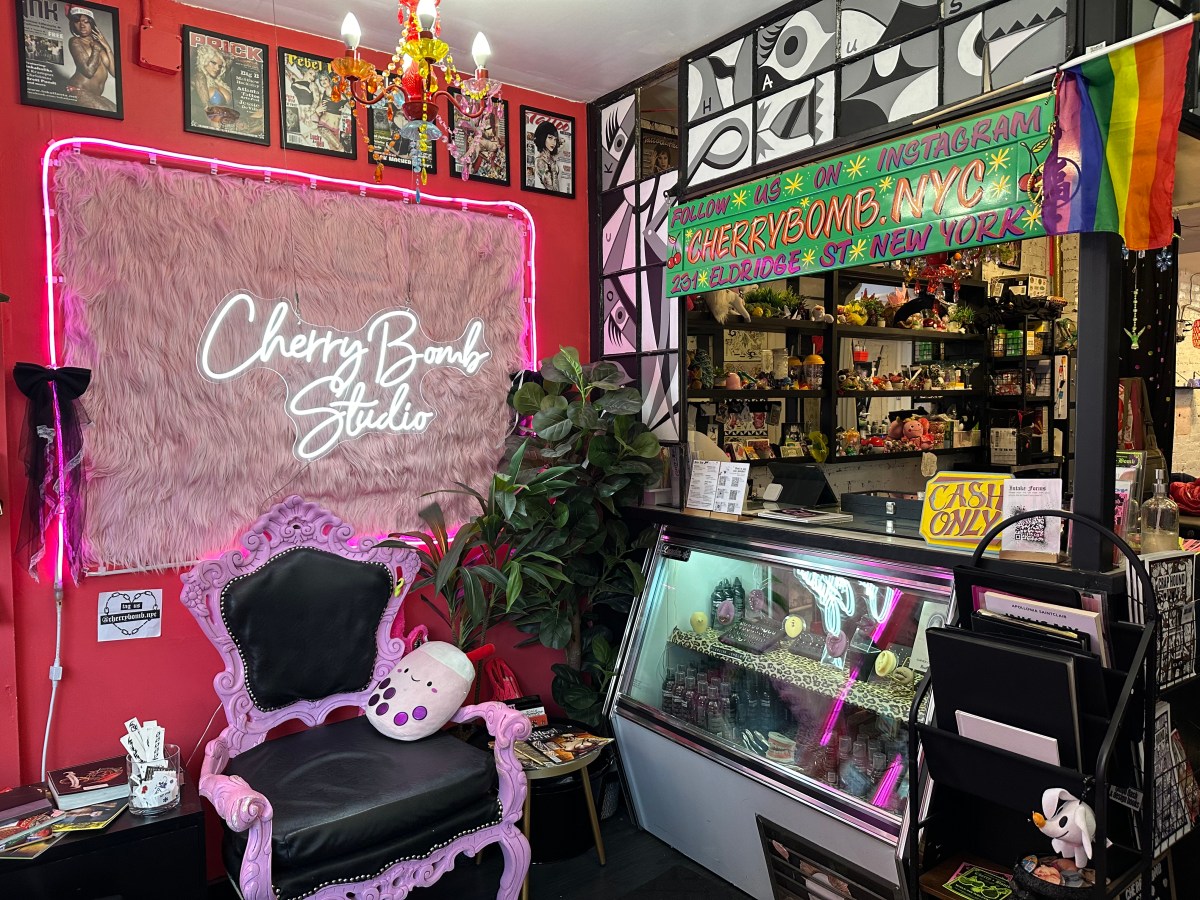Three strangers make friendly conversation outside Haven, a queer women-owned tattoo studio at an undisclosed address in Brooklyn. The gray storefront wards off attention, nondescript except for a magenta moon on the window and a “Haven Clients Only” sign on the secured fence. Haven is deliberately discreet: Co-owners Jes Valentine and Cameron Cox want to protect their artists and clients. “It really does feel like a safe space. The doors are locked every day. Nobody walks in, no creeps off the streets,” Cox said. “We don’t have to deal with any bullshit.”
After Brittnay Cedzich rings the doorbell, a tattooist welcomes the clients inside. They enter a bright room with a chandelier, a candy bar cart, multicolor starbursts, dangling disco balls, a pink fireplace with glitter streamers, a pink lioness with a rhinestone collar, a pink couch, pink counter, pink walls, pink curtains, and a pink feather lamp. Light pop music fills the space. Artists prepare their workstations, and Cedzich relaxes on the couch.
Before receiving her tattoo, a client washes her hands in a quirky bathroom overfull with queer chaos. A cheetah-print shark and a My Little Pony sit by the sink in front of embroidery reading “please don’t do cocaine in the bathroom.” There’s a glittery pink dildo to the left of the mirror and a Medusa-shaped lamp to the right. In the bathtub, a life-size skeleton hangs out in an angel costume, and on the ceiling, a photo of Buffalo Bill stares down at the viewer. It’s gay in a way only gay people would recognize.
In the main room, Valentine prepares a design for Cedzich’s tattoo, the mouse from The Witches. The mouse has rosier cheeks and more sparkly eyes than the mouse in the movie; it’s a unique flash design created by Valentine. Her tattoo is a fitting change to the source material—Haven Tattoo Studio is rosier and more sparkly than most tattoo studios in the city. It’s a unique place created by Valentine and Cox.
“It’s a welcoming and fun environment, whereas a lot of typical street tattoo shops have more of an aggressive man vibe,” client Rai Manning said about Haven.
Queer women are opening their own tattoo shops in pursuit of that “welcoming and fun environment.” The conventional image of a tattoo shop is one of a mostly black space, with gray or red skulls or flames on the walls. Perhaps rap or heavy rock by straight men blasts through speakers, filling the studio with harsh energy while artists alter their clients’ bodies. The intense aesthetics evoke a macho atmosphere—which makes sense, considering that the tattoo industry is 75% male—but several off-the-beaten-path artists are creating alternative atmospheres in self-owned studios. By peering into a few queer and women-centered tattoo shops in New York City, a picture emerges of a newly developing scene uplifting femininity and queerness in a world that all-too-often squashes the feminine and the queer under its shoe.

Jes Valentine at Haven, photo by Trisa Laughlin
Artist Tiffany Lai welcomes her client, Maynor Alas, as he enters a Bushwick studio with a giant bag of candy in multi-chrome manicured hands. Lai and her client, who are both queer, adjust a Godzilla tattoo for over 40 minutes before inking. Lai asks if the smoke is in the right direction, the turquoise in the right shade, the dorsal plates too large, the mouth too small. Alas doesn’t hesitate to specify, and Lai listens. “In traditional spaces, they don’t feel as comfortable speaking up for themselves,” she said. According to her, most studios are not conducive to communication. “Straight white men, they’re a little less empathetic,” she said. She described straight male-dominated tattoo shops as “really heavy and scary,” which she believes intimidates clients from advocating for themselves, especially women and LGBTQ+ clients.
Janina Klahold, a tailor who started getting tattoos 12 years ago, faced the same obstacle at male-owned studios. “When I have male artists, I sometimes feel a little awkward, when I’m stepping into a man’s world,” she said. Klahold felt unwelcome in many male-dominated tattoo shops, and she felt that her voice wasn’t welcome either. “A lot of times I feel like I wasn’t even heard,” she said. For Klahold, the issue boils down to feeling “out-of-place” in a straight male-centered environment. “I was not really accepted in a way, and they were not trying to listen,” she said.
Queer and women-focused tattoo shops provide an alternate experience. Frankie, a podcast engineer, didn’t struggle to communicate when receiving a tattoo from Lai, which she credited to the queer woman-owned, queer-centered setting. “There’s not a barrier that you have to put up to protect yourself in the way that a lot of queer people and a lot of women do when they’re in a space that doesn’t represent them,” she said.

Tiffany Lai, photo by Vivienne Germain
After artists begin inking, clients situate themselves in chairs or on tattoo beds. If the shop proves hostile, they’re already in for the ride; leaving early would result in unfinished artwork permanently marked on their bodies. At Haven, clients seem comfortable. While Cedzich receives her tattoo, she discusses Sister Wives and 90-Day Fiancé with Valentine. “Full of life and laughter and storytelling, it’s like a big sleepover every day,” Cox said. But she stressed that Haven isn’t just for fun; it’s a necessity. “We saw that there was a real need for this, and people were coming to us with their horror stories, terrible situations that they’ve been put in in tattoo shops,” she said.
“There’s a lot of sexual assault accounts in the industry,” Cox said. According to Emma Beckett in Tattooing and the Gender Turn, sexist attitudes and gender-based abuse have been ingrained in tattoo culture for decades—but there aren’t reliable statistics on the issue because cases are largely unreported. Sexual violence survivors, most of whom are female or queer, often face doubt or blame after speaking out. According to a 2020 study, less than 5% of sexual assault accounts are reported, and 20% of reported accounts are dismissed as “unfounded.” In tattoo settings, it’s even more difficult to speak out, due to stereotypes of tattooed women as tough, unrestrained, promiscuous, or receptive to pain, as Beckett explains in her book.
Recently, more survivors have raised awareness about sexual mistreatment and abuse in the tattoo industry: In 2020, #tattoometoo and accounts such as @tsass_uk (Tattoo Sexual Assault Survivor Support), @tattoo_metoo, and @tattoometoorecoveryartists gained momentum on Instagram with thousands of followers. Users shared their stories, from artists requesting sexual photos or acts in exchange for tattoos, to artists groping or raping colleagues and clients.
Women and LGBTQ+ people urgently need safe spaces—especially today, which Cox emphasized. “As we saw with the turnover of Roe v. Wade, women’s rights being stripped, trans rights in the news every day, being challenged, marginalized groups are on the line right now, and we’re here for them, especially after the election,” Cox said. “Everyone deserves to feel safe.”
Some artists creating these safe spaces say that they face resistance from straight male artists and shop owners. “They don’t like to see us thriving,” Cox said. “We’re offering something that needs to be offered, and eventually taking people away from their shops because they don’t want to do better.” Since tattoo artistry barely has a gender pay gap, when artists open shops without macho culture, they create non-patriarchal spaces. Cox and Valentine chose the moon as Haven’s logo because “it’s a huge symbol of the matriarch,” in Cox’s words. According to her, the “weirdest” part of her work is “not feeling the pressure of the patriarchy.”

Haven, photo by Trisa Laughlin
When artists complete tattoos, their clients are often in pain. At Vacation Forever, a queer tattoo studio in Chinatown, Manhattan, owner Kee Kee James tries to make clients feel as comfortable as possible. After inking an original design—a vibrant, fierce tiger in her self-described “trippy” style—on client Beka Jenkins’ back, James offers her a break before adding UV ink embellishments. Jenkins stands up and admires the design in the mirror. She walks around the studio, under its mirrored ceiling and within bubblegum pink walls, moving to soft indie music and looking at provocative yet whimsical paintings by POC, queer, and immigrant artists.
To finish the tattoo, James uses UV ink to make the tiger’s claws, nose, and five eyes a brilliant pink that glows under blacklight. She applies Bactine and numbing cream to alleviate her client’s pain. “My arms are covered in tattoos, I’ve got my ribs done, and I’ve never been offered that before,” Jenkins says. “Male tattoo artists, they don’t give a fuck how you feel,” she continues. “It’s just like, sit through it, grin and bear it, and don’t take a break. It’s nice to feel respected by a tattoo artist.”
James snaps a photo of the tiger and shows it to her client. Jenkins seems confidently pleased. “I needed to feel like I was reclaiming my body that I felt like had been taken from me,” she said. Jenkins sought to turn her “despair” into “pain that I wanted to feel.” “Almost everyone that’s come through, it’s been a similar reasoning,” James replied. “How do we take control of what we can take control of?”
For empowering, personal, and radically safe tattoos, clients like Jenkins and Frankie look for artists who respect them and relate to them. “I want it to be somebody who gets me, who is like me, who has experienced the same prejudices and hardships that I have, ’cause then that makes it more special,” said Frankie.
“She really always made me very comfortable and safe,” Klahold said about James. “I started getting tattoos 12 years ago, so back then, it was only male studios that I could find,” she continued. Now, Klahold patrons Vacation Forever, where she’s received ten tattoos from James. “I can’t stress enough what a welcoming atmosphere there is with Kee Kee,” she said.
“It’s kind of like going to the gynecologist in a way,” Frankie said. “Anyone can do the job, but for somebody who’s going to be getting to know the intimate bits of you, it’s someone I can connect to in that sense, and who I can feel comfortable with,” she continued. “I’m not going to have the risk of being demeaned or shamed.”
When James founded Vacation Forever, she prioritized respect, comfort, and belonging for women and queer people. “I wanted it to be a place for the girls, gays, and theys to feel welcomed, to feel safe, and to not be bullied,” she said. Notably, her efforts extend beyond ink. Vacation Forever hosts drink-and-draw nights, art exhibitions, artist talks, and open mic nights, which are open to everyone—including guests who do not want tattoos. “Queer people have had so much drama in their lives growing up, whether they weren’t included, or their families or whatnot,” James said. “We offer a different kind of support and a different kind of inclusivity.”

Kee Kee James at Vacation Forever, photo by Joey Solomon
As queer and women-centered tattoo shops find their place, they diverge not only from conventional studios, but also from expectations about what LGBTQ+ and women’s work should look like, taking advantage of self-developed freedom. Girls Only, a queer woman-owned tattoo studio in Bedford-Stuyvesant, resists patriarchal standards by rejecting male dominance. Samantha Robles, the studio’s owner and sole artist better known as Cake, chose the name using “girls” as a synonym for “homies.” She tattoos people of any gender—including heterosexual men—but she likes to “call everyone ‘the girls,’” centering the feminine as the default. She also resists patriarchal standards by concentrating her work around more than her identity. Girls Only isn’t only a queer, woman-affirming initiative: Cake primarily focuses on reviving ’90s tattoo culture and engaging in community service.
Cake can resist traditional conventions and external expectations because she works in a self-created, self-curated environment. That’s evident in her studio’s appearance, which resembles a blank canvas: It’s a white basement with an exposed ceiling, scarce furniture, and a partially painted room divider, where she intends to project videos about tattoo culture. She plans to add a lounge area, a library, and paintings by Aya Brown, an artist whose work honors queer women of color. Inspired by NYC’s past underground tattoo scene, Cake finds most contemporary tattoo shops “too polished.” “I really love the grittiness of New York, and I wanted to bring that history into this space, including a lot of the things that mean a lot to me,” she said. “Tattooing in relation to Black people, tattooing in relation to gay people, being mindful of all of these things and how they connect in a way, and tell a bit of a story.”
Cake discusses her friends and influences more than her own work. She’s humble, and she appreciates community. Along with tattooing, Cake uses Girls Only to uplift others. She hosted food distribution, a free Mother’s Day photo shoot, and a dinner for Black queer women and non-binary creatives. Next, she wants to host a free resume class for local youth. “I really feel like I do what I want,” Cake said, illustrating the strength of a self-developed, self-owned studio.

Girls Only, photo by Cake
Ultimately, these tattooists have more to offer than sapphic solidarity. They’re skilled, unique artists, and because they’ve created their own studios with women and queer people in mind, they have the freedom, power, and agency to develop individual styles. Cassandra DeJesus, a makeup artist, was drawn to Cherry Bomb Studio, a queer-owned tattoo shop in the Lower East Side, because of its inclusivity—but she decided to get a tattoo there because of the artists’ work. “A TikTok about them being a woman-based tattoo shop and also queer really caught my attention. I was looking through their artists, and I found something I really liked, so I got a tattoo from them,” she said. “Girls are just my comfort space, and honestly, I found it really empowering.”
Queer and women’s liberation and artistic liberation are inextricable in these spaces. Jade Caton, a tattoo artist, enjoys working at Cherry Bomb because the studio gives artists the freedom to pursue their creativity. “I think the biggest draw of what pulls people in here is definitely the uniqueness of the artists that we have,” she said. “It’s a queer shop. It’s a safe space for everyone.”

Cherry Bomb Studio, photo by Vivienne Germain



If you’re looking for a woman-owned queer-vibe shop in central CT, check out Fox Den in Wallingford. I don’t work there or anything like that, but I’ve had a bunch of work done there.
And in the Hudson Valley, Guts n Glory in Rosendale is woman-owned and queer-vibing. Again, I have work from there.
Ooh this was interesting!